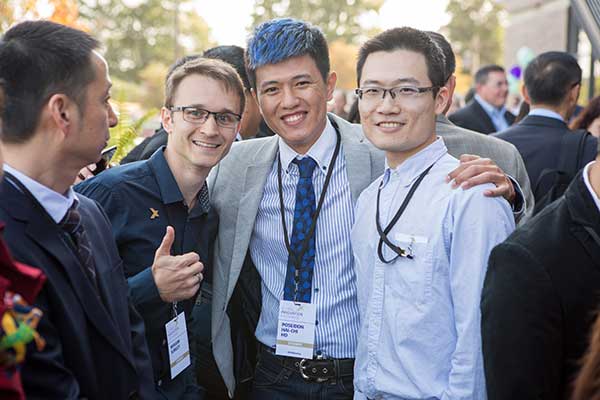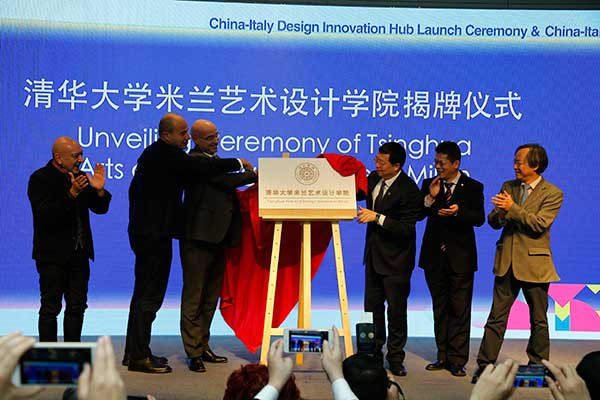
Friends socialize at the opening ceremony of the GIX building in Seattle in the United States.[Photo provided to China Daily]
A new China-Italy research hub in Milan is a step further to embrace the world. Zhang Zefeng reports.
During a visit by the Italian President Sergio Mattarella to China this February, President Xi Jinping and Mattarella witnessed the signing of bilateral cooperation agreements aimed at deepening ties across various fields including culture, innovation, education and trade.
At the signing ceremony held at the Great Hall of the People in Beijing, the China-Italy Design Innovation Hub in Milan was formally established as part of the strategy.
Fast forward to Nov 13, where influential politicians, scholars and entrepreneurs from both countries assembled at Tsinghua University to attend the inauguration ceremony of the China-Italy Design Innovation Hub and the launch of the Tsinghua Arts and Design Institute in Milan.
Based on a long-standing collaboration between Tsinghua University and Polytechnic University of Milan, the hub and the institution are expected to develop innovation in education and help bridge the gap between the design industries of the two nations.
The China-Italy Design Innovation Hub will be Tsinghua University's first educational and research base in Europe.
It is an important part of Tsinghua's global strategy, and will boost ties between the two countries in the fields of education, scientific research and the cultural industries, says Qiu Yong, president of Tsinghua University.
The agreement was deemed as "historic" by Ferruccio Resta, president of the Polytechnic University of Milan. It fits with the process of the internationalization favored by the university, but also benefits students, enterprises, and beyond, he adds.
Cultural cooperation

Chinese and Italian officials and scholars celebrate the launch in Beijing of the Tsinghua Arts and Design Institute in Milan.[Photo by Zhang Yu/China Daily]
According to Lu Xiaobo, the dean of Academy of Arts and Design at Tsinghua University, the institution will launch dual master's programs in areas including fashion design, intelligent manufacturing, environmental design for sustainable growth, as well as the restoration of cultural heritage.
"China has been facing numerous tasks in terms of cultural heritage preservation and restoration, but still lacks the experience in terms of nurturing relevant talented professionals," says Lu.
"Italy has abundant expertise we can tap into when it comes to restoring ancient sculptures, paintings and architecture."
Lu says through the Tsinghua Arts and Design Institute in Milan, faculty members can collaborate with enterprises in innovation projects and conduct the relevant research in Europe, while students will be given the opportunity to engage in academic endeavor and cultural exchange activities in a global setting.
The institution is also expected to collaborate with other schools and departments to develop cross-disciplinary cooperation.
"We try to educate future global leaders while tackling global challenges through design thinking and innovative solutions by crossing disciplinary, cultural, academic and industry boundaries," says Gao Hong, vice-provost and director of the Office of International Education at Tsinghua University.
Going global
Apart from launching the innovation hub, the university has been increasing its efforts to internationalize the scope of its education over the past few years to help its students improve global competence - the capability to learn, work and live with others from different cultural backgrounds - and embrace future opportunities.
"We all live in an interconnected and interdependent world full of uncertainties and challenges," says Gao.
"Students need new skills to thrive, and globalizing our education system is one of the best ways to build such platforms."
Meanwhile, Tsinghua, in collaboration with the Shenzhen government and UC Berkeley, established the Tsinghua-Berkeley Shenzhen Institute in 2014.
The institute, which is supervised by faculties from both universities, tackles global challenges including new energy technology, data science, precision medicine and healthcare.
Separately, a highly interdisciplinary dual master's degree engineering program has been set up by both universities. The institute also established an international academic industry advisory board to develop industry connections.
In 2016, Tsinghua welcomed the first batch of students in the Schwartzman College with three academic tracks - economics and management, public policy, and international studies - with the aim of equipping the next generation of global leaders.
The program invites leaders from different sectors to mentor students in developing their leadership skills. And students from around the world can take field trips around China to see more of the country and better understand its culture.
This autumn, Tsinghua University celebrated the opening of GIX (global innovation exchange) institute building in Seattle, focusing on technology innovation.
The first dual master's degree program there, Connected Devices, integrates design thinking, information technology and entrepreneurial skills to train students integrating resources and leveraging the innovation ecosystem to change the world.
"This is a process to introduce faculty and students to globalization and the ecosystem of global knowledge and global study," says Gao. "We also want to contribute to the internationalization of higher education."
While offering students overseas experience and resources, the university has also been encouraging international institutions across the globe to diversify their campuses.
With more than 3,000 international students from 116 countries and regions on campus, Tsinghua also offers 20 graduate programs taught in English and invites scholars from around China and abroad to give lectures.
In recent years, Tsinghua University has signed more than 280 agreements with universities from 49 countries and regions around the world.
"Eventually, we want to prepare our students to be responsible citizens in an everchanging world," says Gao.
Source: China Daily